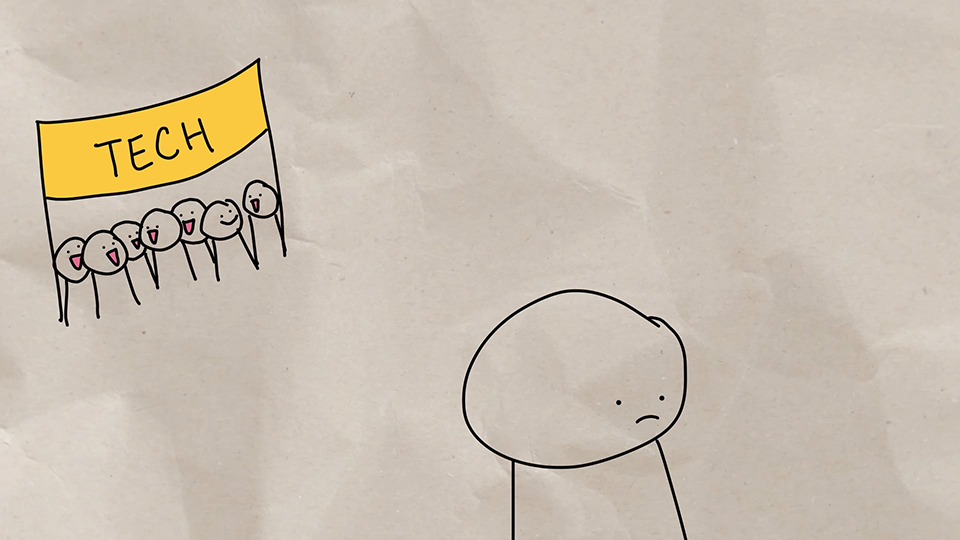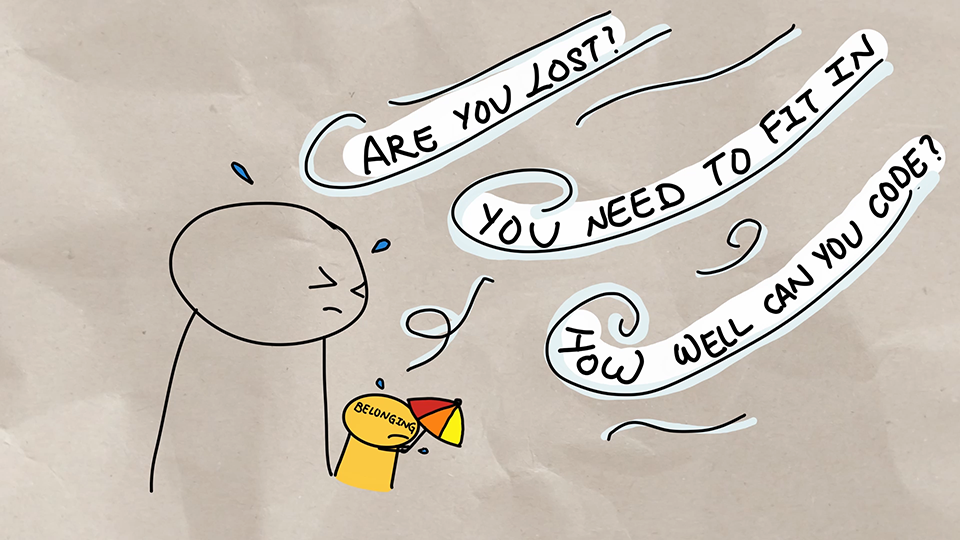Explore why belonging matters in tech
To further help your team cultivate a climate of belonging, you'll examine why belonging is important in tech. You'll also unravel the connections between aptitude and a sense of belonging in a tech space.
Why you need to foster a climate of belonging in tech
It's important to foster a climate of belonging in tech because people who are more effective when they feel like they belong. They contribute more, and they are motivated to persist through challenges. People who don't feel like they belong are more likely to quit tasks, leave projects they find challenging, or leave tech altogether.

Tip
If you feel a sense of belonging in a space, consider your role as a leader to create a sense of belonging for others.
To further explore the concept of belonging in tech, review the following video, which is approximately two minutes in length.
Check in with yourself
A community that invites you in and provides support can make a significant difference in whether you decide to persevere. Evaluate yourself using these questions and statements as a starting point:
Do I fit in?
When do I get to call myself a developer?
Tech isn't for everyone.
Why do I feel like I (don't) belong?
Look at how far I've come!
Do I feel at home in this space?
How can I invite a newbie in?
How can I contribute to the belonging of others?
Belonging is not aptitude
Belonging isn't about aptitude, or whether you believe you can do something. Belonging is about how you feel about yourself. It's also about whether you think of yourself as a "tech person" or as part of the "tech community."
This component of belonging is related to mindset. The idea that someone can be "tech person," or that a defined "tech community" exists, can indicate a fixed mindset about who is in tech.
Note
A fixed mindset is a mental attitude that dictates that you can only do certain things. With a fixed mindset, you believe that basic abilities such as intelligence and talent are fixed traits that you were born with and cannot change.
Using tech tools to determine belongingness in tech
The field of tech is constantly changing and growing. For example, tech tools are always evolving and new ones are frequently being introduced. Computer science students and people who work in tech will often come across new challenges and the need to learn new tools. When they're presented with new technology, two questions can come up:
Self-efficacy ("Can I do it?")
Mindset ("Am I this kind of person?")
Sometimes these lead to the additional questions "Do I belong in tech?" or "Am I a tech person?"
Interacting with the tech environment might affect your attitude about working in tech, and your feelings of belonging in tech. When you try a new tech tool, your interactions with its supporting documentation and community can affect whether you continue to use the tool.
Think back to the last time you tried a new app, tech tool, or a new technique. Maybe you learned a new coding language. Was it easy or frustrating to figure out how to use?
If you found the new tool or skill easy to learn:
Did you think, "This is right up my alley" or "This is so me"?
Was there good supporting documentation that made you feel like the tool was designed with you in mind?
Were you excited by the elegant design, intuitive user interface, or cool new features?
Did you share the tool with peers or your tech community?
Did the experience affect your feelings of belonging in tech?
If you found the new tool or skill challenging:
Did you think, "I'm not this kind of person" or "I don't think this is for me"?
Did you feel so frustrated that you abandoned it altogether?
Did you ask someone for help? If so, was it difficult for you because you felt your inexperience was exposed?
Did the experience affect your feelings of belonging in tech?

What if you were asked to contribute to the product?
Now suppose for a moment that the tool was something created by your company or team. You might have ideas for how it should have been designed or how it should be used.
How would it have changed your frustrating experience if you had been invited to contribute to the supporting documentation, or even suggest a new feature? Welcoming you and taking your ideas seriously might have contributed to your sense of belonging as a person in tech.

Aptitude as a barrier to belongingness
In the past, when you used new or unfamiliar tools, you might have experienced feelings of doubt about your own abilities. Perhaps these feelings arose because you didn't have the same experience and training as others in your class or workspace.
Not understanding a technology might be viewed by others as a signal that you're not qualified, and therefore not one of them. Some in tech exclude others in their space by communicating expectations that they should be able to accomplish certain tasks or have particular knowledge. Technologies like programs, languages, and other tools, are often used to make judgments about people's abilities and technical aptitude.
For example, there is a text-editing, command-line tool that's notoriously hard to use. The inputs it takes are keystrokes and not a mouse or other apparatus. In tech spaces, people sometimes establish how "hard-core" a tech person is based on who is comfortable using this tool.

Have you ever been expected to know a technology or how to use a tool that you didn't have experience with?
How did that make you feel?
Did you feel pressured to learn it in order to fit in or be accepted by your peers?
Did someone help you learn it? Did that make you feel welcomed into the group?
Do you try hard to fit in?
Sometimes you enter a space and feel that you need to change who you are to fit in. Maybe it's because others in the space treat you differently, or don't give your ideas the same respect.

These messages move you further away from the task at hand and discourage you from making contributions, prompting you to leave the task or the space.
There are times when you doubt your belonging. To increase your sense of belonging, you can begin by raising your awareness and noticing spaces where:
You feel a strong sense of belonging.
You're trying hard to fit in.
You don't feel valued for who you already are.
Helping others to support their belonging
Even when you're missing that sense of belonging, you can recognize that your contributions are still valuable. Often there's someone who is eager to support you. Receiving help and support helps foster inclusive environments where people are more likely to feel a sense of belonging.
When you realize you need help and ask for it, you might feel vulnerable. As a mentor, how you provide assistance and your efforts to understand the other person's situation will likely affect their sense of belonging in that space. Consider your answers to these questions:
Have you ever received help in a way that made you feel that you didn't belong? What specifically did that person say or do that made you feel that way?
Have you ever received help that made you feel encouraged or respected? What specifically did that person say or do that made you feel that way?
Has anyone ever gone out of their way to invite you to participate or contribute? Did that make you feel more comfortable in the space?